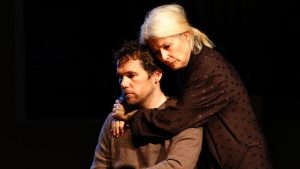Fairfax Studio, Melbourne Arts Centre
Reviewed on February 23, 2011

The early 20th Century, French-Cuban author, Anais Nin, phrased it best when she said, “We see things not as they are. We see things as we are.” For sometimes, our true selves are only realised through the eyes of others. Herein lies the crux of Apologia, the multi-layered, electrifying new play by Alexi Kaye Campbell.
Kristin Miller has written an autobiography, or as she calls it, a professional memoir. Retracing her odyssey both as an art historian and sixties’ leftist radical, she invites the people closest to her over for a celebratory dinner. The evening and its aftermath reveal many home truths. Two points in particular, are so painful and confronting, it isn’t until the play’s conclusion, that their impact is fully grasped.
It would be easy to dismiss the key protagonist, Kristin, as a opinionated, venal bitch. She is not a sympathetic character. Nor, under Jennifer Flowers’ tight direction, is Miller meant to be.
Art appreciation is her passion, and words are her forte. An exacting grasp of language in fact, has been her pathway to success. Kristin is worshipped the nation over for this driven dedication to her craft.
The first to agree would be her gay best friend, devoted follower, and life-long confidant, Hugh. Gibe for gibe, veteran actor, Ron Falk, does an excellent job keeping pace with Miller.
Still, achieving career status has come with a heavy price.
Her ex-husband (now deceased), possibly threatened by Kristin’s success, sought and won custody of their young two boys. Now grown adults, Miller’s sons have nothing but open disdain for her.
Not only has she failed to mention them once in her new tell-all book, two childhood incidents specifically mark their ongoing anger and disappointment.
In their eyes, she let them down as a parent and over the course of the play, both men let their feelings fly. Albeit, in vastly different ways.
Her eldest, Peter, brims with stifled, middle-class rage.
His job as a high-paid international banker infuriates her. So much, that she chides him for ‘raping the African economy’. (Sometimes, in self-defence or simply for her own amusement, Kristin’s barbed observations like this one pepper the play.)
Also, knowing his mother’s distrust of organised religion, Peter’s American partner is a younger woman he met at a Christian fellowship group. Played with spiteful glee by Ian Bliss, her son has deliberately become everything Kristin stands against.
On the other hand, Kristin’s youngest, Simon, exists in stark contrast to Peter.
A failed writer, both lost and aimless, he walks through life in a haze. To the frustration of his material-hungry partner, Claire, Simon disappears for days on end without explanation. Late to the party, his prolonged absence sends Kristin into a panic.
Patrick Brammall gives Simon a gentle touch; his pain is acutely felt.
The extended second act scene between himself and Kristin, where she tends to his cut hand, (either injured or self – inflicted in transit, though that point is never made known), clearly manifests their relationship. Staged in painterly candlelight, only here do we see her softer side.
Naked anger may motivate the play, but within it, there are many moments of hilarious high – comedy.
For example, Peter’s fundamentalist girlfriend, Trudi, suffers from interminable foot in mouth. A clumsy desire to please only makes the occasion worse. She is out of place from the beginning.
Her gift to Kristin, a mysterious African mask Trudi found in Liberia, becomes a source of great amusement for the other guests. (Only later is its true significance revealed.) Further, a dinner table accident between herself and Claire, the partner of Kristin’s other son, serves to highlight Trudi’s preclusion.
Thanks to Laura Gordon’s faultless accent, (and expert vocal coaching by Anna McCrossin-Owen), her Trudi is a fascinating, youthful counterpoint to Kristin’s world-weary cynicism. In the play’s final moments, (but without giving too much away) the young woman’s presence becomes pivotal in Kristin’s self – awakening.
Claire, struggling to defend her legitimacy as a actress, is no match for Kristin. As the soap star with a sordid double life, Helen Christinson works her character to the hilt.
Played by Robin Nevin, her Kristin is a study in masterpiece acting. Like Lady Macbeth, The Glass Menagerie’s Amanda Wingfield, August: Osage County’s Violet Weston, and others before her, in Nevin’s capable hands, Campbell’s leading lady will become one of the great tragicomic matriarchs of live theatre.
Finally, it is no accident that religious iconography permeates Apologia.
From heated exchanges between players about higher worship to Kristin’s detailed description of Giotto, the father of Renaissance painting, that symbolism is everywhere. Never more so, than when Trudi spills wine on Claire’s expensive dress or when Kristin is cleaning up her son’s wounds. This perspective gives the play a greater significance, where each character stands both defines and divides them.
At the outset, one is thrust into the drama, and the Art Centre’s Fairfax studio is the perfect story-telling space for this brand of theatre. For, this isn’t a play at all. Instead, audience members become spies inside a snapshot of damaged and disparate souls.
Apologia is playing until April 9.
Image Source: The Sydney Morning Herald
